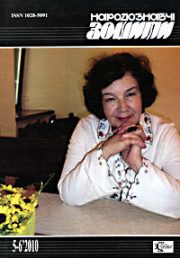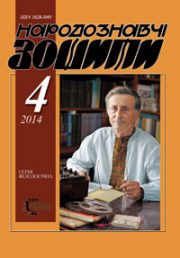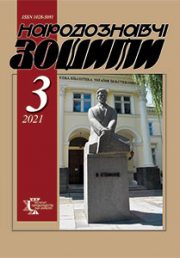The Ethnology Notebooks. 2024. № 3 (177), 510—517
UDK: 2:316.3(=161.2):[159.9+32]
DOI https://doi.org/10.15407/nz2024.03.510
STOTSKYI Yaroslav
- ORCID: https://orcid. org/ 0000-0003-0429-8740
- Doctor of Historical Sciences, Professor,
- Ivan Puluj Ternopil National Technical University,
- Professor of the Department of Psychology,
- 56 Ruska Str., 46001, Ternopil, Ukraine,
- Contacts: e-mail: jarstotskyj@ukr.net
Abstract. Ukraine is a multi-ethnic and multi-confessional country, with a significant majority of its citizens being Christians of various denominations and Ukrainians by nationality.
Religious, and specifically confessional identity, is closely linked to national identity, and therefore the purpose of the study is to highlight this connection in the activities of the Ukrainian Orthodox Church.
Hence, the object of the study is to reveal how religious (confessional) identity and confessional consciousness affect national identity.
The subject of scientific consideration is the position of the hierarchy and parish clergy of the UOC in relation to Ukrainian society, both in the past and in the present.
The relevance of the research problem is related to the fact that the real actions of the clergy of the pro-Moscow UOC harm the national security of Ukraine, destabilize Ukrainian society in the current years of the Russian-Ukrainian war, and, through their confessional identity, have a hostile impact on the national identity of Ukrainian citizens.
The methodology of the study is based on comparative historical and systemic methods, distance and psycholinguistic analyzes, and methodological pluralism in the context of determinism.
Keywords: religious identity, confessional identity, national identity, religious consciousness, national consciousness.
Received 22.04.2024
REFERENCES
- Kolodny, A. (Ed.). Disciplinary Religious Studies: a collective monograph. Ukrainian Religious Studies (Special issue 2009—1). Kyiv [in Ukrainian].
- Filipovych, L.O. (Ed.). (2006). Religion and Nation in the Public Life of Ukraine and the World. Kyiv: Naukova dumka [in Ukrainian].
- Vivcharyk, M.M. (2004). Ukraine: from ethnos to nation. Kyiv: Vysha Shkola [in Ukrainian].
- Gutkovska, I., & Balukh, V. (Ed.). (2015). Religious identity of a multicultural region: tolerance as a value and psychological dimension of modern society. Worldview and Value Self-Determination of a Person: Tolerance in Historical and Intercultural Dimensions: a collective monograph (Pp. 156—169). Chernivtsi: Chernivtsi National University [in Ukrainian].
- Vuyets, P. (2023). The ban on the Moscow Church: who is for and who is against? Lists of deputies are published for the first time. Retrieved from: glavcom.ua (accessed on October 13) [in Ukrainian].
- Shuba, O.V. (1999). Religion in the ethno-national development of Ukraine (political analysis). Kyiv: Krynytsia [in Ukrainian].
- (2024). In Bukovyna, a priest of the UOC-MP did not allow a military to be buried in church. Religious Information Service of Ukraine (accessed March 20) [in Ukrainian].
- (2024). ROC calls on believers to «holy war» with Ukraine. Media Detector (accessed March 28) [in Ukrainian].
- Semin, S.V., Kalnysh, Y.G., Petryk, V.M., & Ostroukhov, V.V. (2002). Church-State Relations: World Experience and Ukraine (Historical and Political Analysis). Kyiv: European University Press [in Ukrainian].






